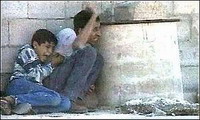French TV network tries to make Israel look responsible for death of 12-year Palestinian boy
Israel has accused a French TV network of making Israel look responsible for the September 2000 shooting death of a 12-year Palestinian boy.

The claims, made by a senior government official, go further than an official army investigation into the incident. The army probe said it was highly unlikely that troops shot the boy, but did not rule out the possibility altogether or make any accusations against the French network.
Palestinians blamed Israeli troops for the death, and the incident - which took place in the early days of the second Palestinian uprising against Israel - has become a recurring symbol for Palestinians of excessive Israeli force.
Viewers around the world were shocked by footage the France 2 network aired on Sept. 30, 2000, showing a terrified Mohammed al-Dura and his father cowering in front of a wall amid a furious exchange of fire between Israeli forces and Palestinian militants in the Gaza Strip.
In the France 2 report, the father gestured frantically to try to stop the shooting as the boy screamed in terror. The camera then cut to a shot of the motionless boy slumped in his father's lap. The report said the gunfire had come from nearby Israeli positions.
A group of Israeli lawyers, Israel Law Center, repeatedly petitioned the Israel Government Press Office to revoke France 2's press credentials based on this report.
Government Press Office director Danny Seaman denied the request, but in his response to the lawyers, accused the French network of manipulating its footage and harming Israel.
"The events of that day were in fact staged by the network's cameraman in Gaza, Mr. Talal Abu Rahma," Seaman wrote in the Sept. 23 letter, a copy of which was obtained by The Associated Press.
"Events could not have occurred as they were described by the network's reporter, Charles Enderlin, since they contradict the laws of physics," Seaman wrote.
This "blood libel," Seaman added, "inflamed the Arab world and led to many victims in Israel and across the world."
In an interview, Seaman said the direction from which Israeli troops were firing wouldn't have allowed their bullets to strike the father and son. The footage did not show the moment of the boy's death, he added.
Seaman did not say what, if any, additional evidence he had beyond the army probe seven years ago.
Immediately after the shooting, army officials said the gunfire "apparently" came from Israeli positions. But a military investigation subsequently determined it was "quite plausible that the boy was hit by Palestinian bullets in the course of an exchange of fire."
Seven years later, the circumstances of the shooting remain in dispute.
Last month, the Israeli army reopened the contentious affair by asking France 2 to turn over unedited footage of the boy's death. The request was connected with a legal dispute in France between the network and a media watchdog who accuses it of staging the incident.
Enderlin and the TV network have filed a libel suit against the media watchdog, Philippe Karsenty. A judge ruled in favor of Enderlin last year. But Karsenty appealed, and the court has ordered the television network to release unedited footage of the shooting death.
The court is to view the video Nov. 14, the officials said. No decision is expected in the appeal before February.
Enderlin was not immediately available for comment. In the past, he has stood by his story, but has declined to discuss the case while it remains in court.
Subscribe to Pravda.Ru Telegram channel, Facebook, RSS!


